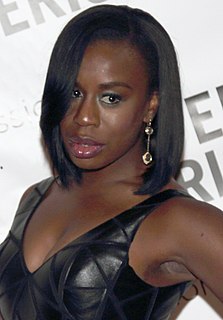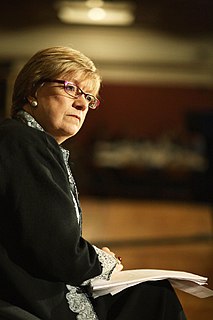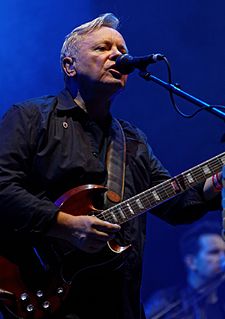A Quote by Uzo Aduba
My mother is a fighter. After she battled polio and learned to walk again, the doctors told her she would be a cripple her entire life. Instead of accepting defeat, she refused this fate and went on to become the West African Womens Singles tennis champion in college.
Related Quotes
My mother lived her life through movies and books - she read everything there was to read. And she read to me every night. I never went to sleep without her reading to me. And she fantasized about the book and she would talk about it, the place, and you would think that after she read the book and after she told you stories about it, that she had actually been there. I learned about story from her, and I learned the value of a great story, and the value of great characters.
She was in a terrible marriage and she couldn't talk to anyone. He used to hit her, and in the beginning she told him that if it ever happened again, she would leave him. He swore that it wouldn't and she believed him. But it only got worse after that, like when his dinner was cold, or when she mentioned that she'd visited with one of the neighbors who was walking by with his dog. She just chatted with him, but that night, her husband threw her into a mirror.
After my mother died, I learned that she'd had a scholarship to the University of Nebraska, but - in kind of a tradition that females don't do things like that - her father prevented her from going. She always said that she wasn't allowed to go to college, but until she died, I never knew that she'd had this scholarship.
Her life was beginning to make sense again, although she couldn’t say she was enjoying it. But her mind was clear, and her heart was not constantly as heavy. Only when she thought about him. But she knew that in time, she’d survive it. She had done it before and would again. Eventually the heart repairs.
She didn’t understand why it was happening,” he said. “I had to tell her she would die. Her social worker said I had to tell her. I had to tell her she would die, so I told her she was going to heaven. She asked if I would be there, and I said that I would not, not yet. But eventually, she said, and I promised that yes, of course, very soon. And I told her that in the meantime we had great family up there that would take care of her. And she asked me when I would be there, and I told her soon. Twenty-two years ago.
She was the first person on either side of her family to go to college, and she held herself to insanely high standards. She worried a lot about whether she was good enough. It was surprising to see how relieved she seemed whenever I told her how amazing she was. I wanted her to feel strong and free. She was beautiful when she was free.
She writes that one of the moments that she felt most useful was when her mother had a headache, and she would stroke her head and rub her forehead. And I think Eleanor Roosevelt's entire life was dedicated to two things: (one) making it better for all people, people in trouble and in need, like her family.
She was wearing a pair of my pajamas with the sleeves rolled up. When she laughed I wanted her again. A minute later she asked me if I loved her. I told her it didn't mean anything but that I didn't think so. She looked sad. But as we were fixing lunch, and for no apparent reason, she laughed in such a way that I kissed her.
Victory in defeat, there is none higher. She didn't give up, Ben; she's still trying to lift that stone after it has crushed her. She's a father working while cancer eats away his insides, to bring home one more pay check. She's a twelve-year-old trying to mother her brothers and sisters because mama had to go to Heaven. She's a switchboard operator sticking to her post while smoke chokes her and fire cuts off her escape. She's all the unsung heroes who couldn't make it but never quit.
Once again she would arrive at a foreign place. Once again be the newcomer, an outsider, the one who did not belong. She knew from experience that she would quickly have to ingratiate herself with her new masters to avoid being rejected or, in more dire cases, punished. Then there would be the phase where she would have to sharpen her senses in order to see and hear as acutely as possible so that she could assimilate quickly all the new customs and the words most frequently used by the group she was to become a part of--so that finally, she would be judged on her own merits.


































